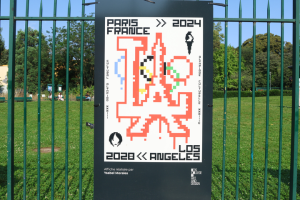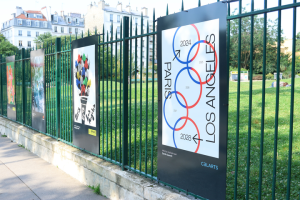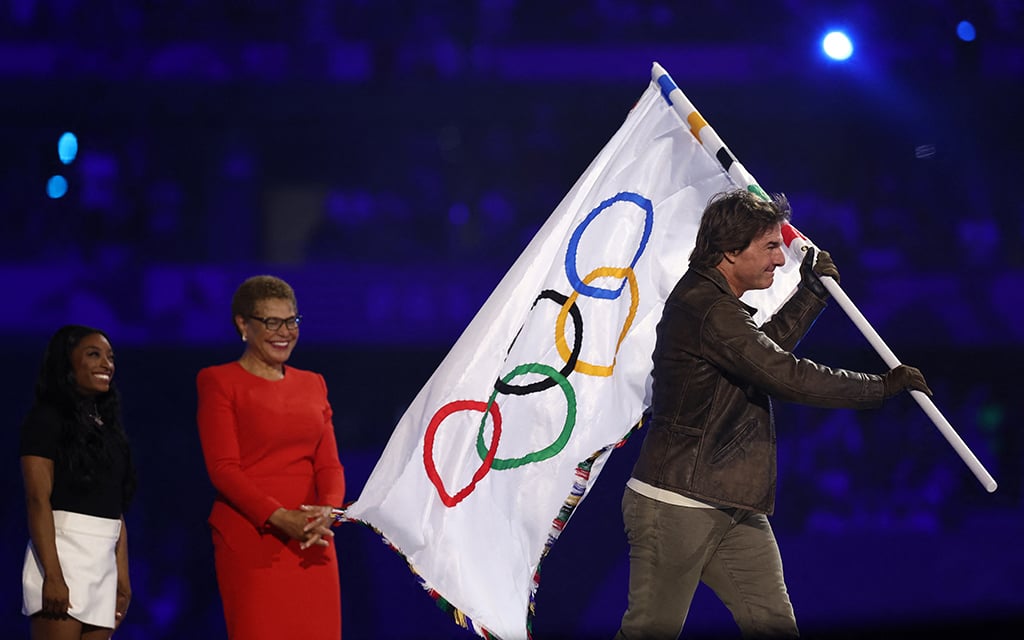PHOENIX – Last summer, all eyes were trained on the pageantry and spectacle of the 2024 Summer Olympics in Paris.
Fast forward eight months, and many have begun to look ahead to 2028 and 2034, when the Olympics return to American soil after a 26-year absence.
While Los Angeles, which last played host to the Olympics in 1984, was awarded the 2028 Olympics more than eight years ago, the International Olympic Committee officially named Salt Lake City, Utah, as the host of the 2034 Winter Games during the Paris Games.
The dual hosting rights have stirred early anticipation across the U.S., but even amid the celebration, questions around policy and inclusion have emerged – namely, the Trump administration’s recent ban on transgender athletes in women’s sports, which conflicts with an International Olympic Committee rule allowing transgender participation.
In 2017, when Los Angeles was awarded the Games, Trump was in his first term, and his administration developed a working relationship with outgoing IOC President Thomas Bach, who will step down in June.
But the upcoming change in IOC leadership hasn’t slowed down any future plans for both cities.
Venues for events at the 2028 Games, such as swimming at Sofi Stadium and flag football at BMO Stadium, have been confirmed by the Los Angeles City Council as recently as March 31st. In Salt Lake City,
Derek Miller, the President and CEO of the Salt Lake City Chamber of Commerce, who helped spearhead his city’s delegation and bid to host the games, is preparing for the city’s second time hosting after its first time in 2002.
Just as the athletes will realize life-long dreams years in the making, this bid was a realization of a plan also set in place many years ago.
“(The Utah Delegation) has been planning for this,” Miller said. “We first created an exploratory committee over 10 years ago, to look at bringing the games back to Utah. At that time, we didn’t know that it would be 2034. As things sort of shaped up and we worked closely with the U.S. Olympic Committee, it looked like 2034 was the right time. So that’s what we put our bid in for. And that’s what we ended up winning.”

An Olympic-themed poster by Noah Cousineau of ArtCenter hangs on display in Paris during the 2024 Summer Olympics to preview the Los Angeles Games in 2028. (Photo by Devon Henderson/Cronkite News)
Despite recent U.S. policy changes that have created a stir in international waters, Los Angeles is forging ahead to prepare for the 2028 Games, and Americans are ready to showcase their country and its offerings in a way France displayed last summer.
“(America stands out because of the) variety we have,” said Jenny Meyerson, a Phoenix native and Team USA fan who traveled to Paris. “We truly are a melting pot of different groups of people from all over the world. What’s neat is all the different food options, all the different ethnic groups coming together and being representative of the United States. We don’t all look alike. We don’t all speak alike, and that’s something that is wonderful.”
In 2002, Salt Lake City hosted 78 sporting events and 2,399 athletes with more than 1.5 million tickets sold. Another 2.1 billion tuned in to watch the Games across 160 countries and territories, amassing 13.1 billion total viewer hours.
It was a sparkling success – and one that Miller hopes to build on literally and figuratively.
“We have all the venues,” Miller said. “They were built for the 2002 Winter Games. We are going to be focusing on a lot of infrastructure things that will help bring the world to Salt Lake City.
“In 2002, for those Games, we built a light rail and we built a commuter rail. Now we’re talking about what we can build over the next 10 years so that in 2034, we’re celebrating lighting the cauldron, but we’re also celebrating a lot of accomplishments that we’ve done over the next 10 years.”
The process of securing one of the world’s premier sporting events is long, strenuous – and expensive.
There’s a budget to declare. Utah’s Olympic bid projected a total cost of just under $4 billion, with a core operating budget for the event at $2.8 billion, according to the Associated Press.
The city must demonstrate an ability to host the games. For that, the success of the 2002 Olympics provided more than enough evidence.
More than anything, community support reigns supreme. For Salt Lake City, the same fans who welcomed supporters from all over the world in those 2002 Games were the driving factor for its return. By the time the world’s most famous torch is set alight in the Beehive state, it will have been 30 years since the last time it resided in Utah.
Many of the kids who were treated to a gallery of Olympic heroes in their hometown still show a desire to experience it again.
“The most important thing is to show that you have great community support,” Miller said. “We’ve been doing polling on (hosting the Olympics) in Utah, in Salt Lake City, for a number of years. Eighty percent of the people in Utah support hosting the Games. Having that broad community support is probably the most important thing that any community could do.”
Check.
Now, the planning committee’s preparations are well underway for the Games, which are now less than 10 years away. They aren’t the only ones already making plans for the Salt Lake City Games.
“One of my best friends lives in Park City, Utah,” said Caleb McNitt, an American spectator at the Paris Games. “I texted him the day we found out and was like, ‘I’m just reserving my room already.’ That’s a standard already.”
The success of the Olympic Games depends on the help and support of thousands of volunteers. Everything from ticket collectors, janitors, ushers, and anything else requires the labor of volunteer workers to put on a connective and uplifting event.
The Paris Olympics self-reported that they were supported by more than 45,000 volunteers for the duration of the Games. The London Games of 2012 needed 42,312 volunteers to earn their bid.
By the time 2028 rolls around, it will have been 44 years since the last time the eternal flame rested in the City of Angels. The 1984 Los Angeles Games reported that 28,742 volunteers helped run the event. Among them was Steve McNitt, Caleb’s father, who was a boxing access controller in those ‘84 games.

Symbolizing the transition from the 2024 Summer Olympics to Los Angeles in 2028, themed posters and logo designs line a wall in Paris. (Photo by Devon Henderson/Cronkite News)
“I’m excited they’re coming back,” Steve McNitt said at the Paris Games. “I get to go volunteer again. It was such a great experience to be there day after day working with all the athletes from people from all over the world.
“It’s going to be a lot of different events in a lot of different places. I expect it’s going to be amazing. It’s (Los Angeles), we do things big and we do things right. And it’s not that they’re not doing it right here (in Paris). They’re doing great, but it’s going to be just off the charts.”
Like Salt Lake City in 2002, Steve believes the next Summer Games will have to live up to its successful predecessor from the same city.
“(1984 Los Angeles Olympics) was great,” Steve said. “It was the best I’ve ever seen. The traffic was great, the people were amazing.”
Steve wasn’t the only American spectator in Paris, inspired by the monumental scale of it all, to desire to volunteer in aiding America’s effort to put on a spectacular production of its own.
“I’m actually hoping to volunteer as a nurse for the 2028 Los Angeles Olympics,” Meyerson, a trauma nurse, said. “The Winter Olympics in Salt Lake City did a fabulous job. They did one of the most fabulous jobs of all nations with Olympic preparation. (Los Angeles) is going to have their work cut out for them to do as good of a job.”
While excitement remains elevated, some Americans have reservations about some aspects of so many high-profile events coming in the near future.
“I do worry about the cost,” said John Pinto, a West Palm Beach, Florida native who frequents the Olympics. “I want it to be better for the athletes. It’s very difficult for the athletes’ families to attend. With what I’m seeing now, and the price of the Olympics, I hope we can provide support to the athletes’ family so they’ll be able to be there for their kids.”
Reservations will likely grow stronger over the next few years, but one sentiment has risen above the rest. The Olympics have a unique, indomitable ability to bond. The goal is to supersede division and create unity where previously there was a disconnect. It aims to create the world’s greatest diversion from the evils of that same world.
Now America has been locked into hosting the globe’s biggest celebration two times in the next decade. There’s a plan in place that’s already in motion. The Utah planning committee is aiming to take notes from Paris to apply to their own Games for the ultimate fan experience.
In a country as famously divided as the U.S., most Americans can agree on one matter of the future.
“The Olympics are sort of what’s right with the world,” Caleb said. “Let’s bring the world together for sport.”

